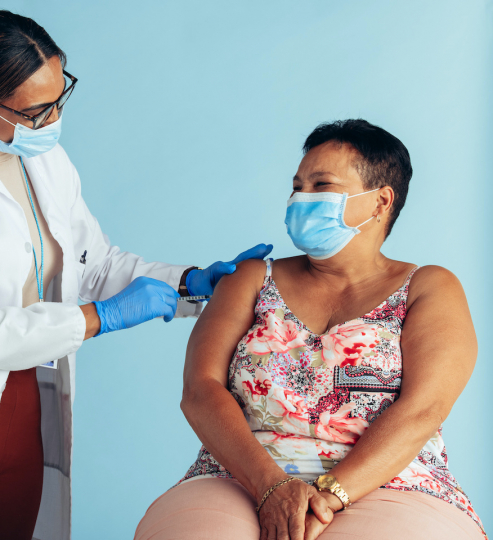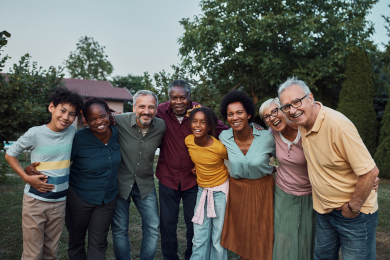Conquering the Winter “Miseries”
You’re sneezing, or coughing, or blowing your nose non-stop or popping lozenges to soothe a sore throat. Or maybe all of the above.
It’s a winter misery, all right. But which one? And what can you do to make it stop faster? And how can you reduce the risk of a repeat bout?
For answers, Senior Planet turned to Nisha Rughwani, MD, professor of geriatrics and palliative care at the Icahn School of Medicine at Mt. Sinai, New York, as well as the CDC and other expert resources.
Colds vs. Flu vs. COVID vs. RSV
This year, there’s an extra big alphabet soup of what could explain those symptoms—from a simple cold to influenza to COVID to RSV, the Respiratory Syncytial Virus that’s been sickening not just the very young but also older adults.
…adults average 2 or 3 colds a year, and children even more.
According to the CDC, it’s not possible to tell the difference between influenza and COVID just by the symptoms because they share so many. Both can be accompanied by fever, chills, cough, difficulty breathing, fatigue, sore throat, runny or stuffy nose, body aches, headache, vomiting or diarrhea and change in (or loss of) taste or smell.
That’s why testing is so crucial to determine if it’s COVID, Rughwani told Senior Planet. The CDC has extensive guidance on when to test (immediately if you have symptoms) and which type of test to use when.
RSV in older adults (as well as in infants) can be severe, even life-threatening. Symptoms mimic that of a cold, with sneezing and coughing, but fever and wheezing can also occur. Tests are available for RSV.
Remedies
If it is COVID, Paxlovid (nirmatrelvir/ritonavir), an anti-viral, ‘’will help minimize the duration of the illness,”Rughwani says. Other anti-virals, both oral and intravenous, are also available if you’re at risk of developing severe disease, as the CDC explains.
And, if you are very sick with flu, you can get Tamiflu (oseltamivir), Rughwani says. Here, a Cleveland Clinic physician explains the pros and cons of Tamiflu.
Avoid Benadryl, Rughwani says, as it can cause drowsiness and affect steadiness, making falls more likely. Nondrowsy antihistamines are acceptable, she said.
She recommends Tylenol (acetaminophen) over NSAIDS (non-steroidal anti-inflammatory drugs) like aspirin, ibuprofen (Motrin, Advil) or naproxen (Aleve) because NSAIDs can cause gastric irritation and lead to bleeding and ill effects on kidney function.
Or turn to home remedies for congestion, Rughwani suggests. “Steaming is good.” Taking a hot shower with the door shut could help. Or just steam a bowl of hot water, add some menthol, cover your head with a towel and breathe it in for 10 minutes, she says.
Keep Moving or Stay Collapsed?
To exercise or stay under the covers as you begin to feel better? “If you have fever or body aches, you probably don’t want to be exercising,” Rughwani notes. But once you feel better (and barring advice to the contrary from your own doctor), it’s OK and healthy to start moving, she says. (Bad weather? Check out Senior Planet’s exercise classes on Zoom.)
Dodging the Next Bout
How to reduce the risk of déjà vu? “Masking helps tremendously,” Rughwani points out, not just for COVID but other illnesses. Even one-way masking can help. Avoiding very large indoor gatherings and tight spaces can also help reduce risk.
Flu vaccine isn’t perfect, but can go a long way toward reducing risk. For those over 65, the higher-dose flu vaccines can boost protection, but any flu shot can help if the high-dose isn’t available. Getting vaxxed in September or October are ideal times, the CDC says.
Knowing the statistics might up the resolve to practice preventive measures. For instance, adults average 2 or 3 colds a year, and children even more. Adults who are around young grandchildren regularly will skew higher than average, especially if the kids are in preschool or school. So masking might be not as onerous for those, given the potential payoffs.
COVID-19 boosters can help, too, as this CDC report finds, but a majority of adults say they have not gotten the latest booster, the bivalent vaccine meant to protect against the latest variants.
No vaccine for RSV is yet approved, but one under study from Pfizer was given the fast track by the FDA so could be available soon.
Your turn: Got a fail-safe home remedy that gets you on the road to recovery from the flu, a cold, COVID, RSV faster? Please share.

Kathleen Doheny is a Los Angeles-based independent journalist, specializing in health, behavior, fitness and lifestyle stories. Besides writing for Senior Planet, she reports for WebMD, Medscape, Endocrine Web, Practical Pain Management, Spine Universe and other sites. She is a mom, mother-in-law and proud and happy Mimi who likes to hike, jog and shop.
Doheny photo: Shaun Newton
This article offered by Senior Planet and Older Adults Technology Services is for informational purposes only and is not intended to substitute for professional medical advice, diagnosis, or treatment. Always seek the advice of your physician or other qualified health provider with any questions you may have regarding any medical condition. If you think you may have a medical emergency, call your doctor or 911.
Editor’s Note: Today’s guest column on the potential for a “business bonanza” in 2025 comes from Manward Press Chief…
Copyright © 2025 Retiring & Happy. All rights reserved.








